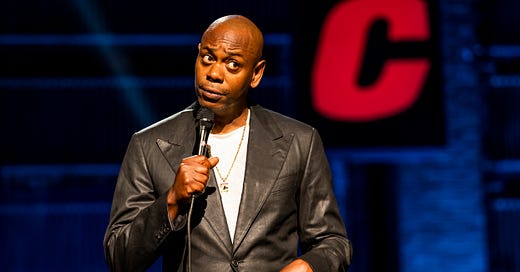I spent a lot of real estate this week slagging Netflix for its myriad problems, particularly in comparison to some of the other streaming entities. So, allow me to end the week by praising the company on one important metric: its commitment to artistic freedom in the face of attacks by censorious know-nothings within and without the company.
Yesterday afternoon, Variety reported that Netflix had updated the “corporate culture” memo laying out ideas and ideals that employees, current and prospective, are expected to hew to as employees of the company. Netflix is very into its culture, believing itself to be less an entertainment company that a tech company, constantly in start-up mode. They expect long hours and pay huge premiums to attract the best talent.
In the latest iteration of the memo, there’s a new section on “Artistic Expression.” In this section, the brass lays out, very clearly, that Netflix a.) brings on a diverse set of voices working in a diverse set of countries while b.) acknowledging that some of this diversity might make employees uncomfortable and c.) suggesting that they look elsewhere for employment if they cannot handle being forced to work on a project made by someone they disagree with or that espouses views they disagree with.
Here’s the text of the section, in full:
Entertaining the world is an amazing opportunity and also a challenge because viewers have very different tastes and points of view. So we offer a wide variety of TV shows and movies, some of which can be provocative. To help members make informed choices about what to watch, we offer ratings, content warnings and easy to use parental controls.
Not everyone will like—or agree with—everything on our service. While every title is different, we approach them based on the same set of principles: we support the artistic expression of the creators we choose to work with; we program for a diversity of audiences and tastes; and we let viewers decide what’s appropriate for them, versus having Netflix censor specific artists or voices.
As employees we support the principle that Netflix offers a diversity of stories, even if we find some titles counter to our own personal values. Depending on your role, you may need to work on titles you perceive to be harmful. If you’d find it hard to support our content breadth, Netflix may not be the best place for you.
Now: this is pretty straightforward stuff! It is … odd that an entertainment company would have to tell its employees that some of the work they do will be provocative and everyone might not agree with everything being produced, but that’s just part of the job. Your job isn’t to agree with it all, it’s to make what’s produced a success.
But kudos to Netflix for refusing to bow and scrape to the tiny minority of activists within the company who loudly pronounced their dislike of Dave Chappelle. Because this entire section is all about Chappelle; it’s very explicitly a reaction to the angst felt by a handful of vocal, whiny employees angry that he said some things they disagree with in his various, nefarious specials. That the service can be large enough to contain the multitudes of Dave Chappelle and Hannah Gadsby should be a point of pride at Netflix, not a source of conflict.
I can’t help but feel that this is at least a little ideological for Netflix chief Ted Sarandos; as Matt Belloni noted in his newsletter last year at the height of L’Affaire Chappelle, Sarandos is a lover of comedians and a student of comedy. And defending the right of a comedian to explore tricky ground is a bedrock principle with this sort of artist.
Regardless, Chappelle is irreplaceable at Netflix. There’s simply no one else like him. Programmers and flacks and executives, on the other hand? Dime a dozen. We’ll see if they have the courage of their convictions to hit the road in response.
Make sure to listen to our special bonus members-only-forever episode of Across the Movie Aisle on the great Sam Raimi, indie horror kid made good. And if you aren’t a Bulwark+ member, sign up today!
Links!
I don’t really understand why employees at PlayStation expect their boss to take a stance on a fraught socio-political issue that has nothing to do with video games.
Betteridge’s Law states that any headline that ends with a question can be answered in the negative. Keep that in mind while reading Jonathan Marks’s review of It’s Not Free Speech, which is titled “Do We Really Need to Rethink Academic Freedom?”
This week on BGTH, I talked to Suzanne Joe Kai, director of a new-to-Netflix documentary about Ben Fong Torres, the legendary journalist who is perhaps best-known now for being a supporting character in Almost Famous. But he’s so much more than that, as Suzanne’s doc shows.
Elsewhere at ATMA, we reviewed Doctor Strange in the Multiverse of Madness. I know I’m grasping at straws, but I liked the Raimi-isms! They’re fun.
RIP Fred Ward, one of the greats. I feel like very few people are going to mention this, so I will: he was great as the redneck dad trying to track down his kid in the Todd Phillips flick Road Trip.
Assigned Viewing: We Need to Talk About Kevin (Prime Video)
I cannot track down the sourcing on this, but I have a vague memory of someone saying that a movie star first comes to prominence via the sort of role that most reflects their natural personality. The context of this was Ben Affleck and the movies being cited were Mallrats and Dazed and Confused, so it wasn’t, you know, the most flattering thing to say.
Anyway, I thought of this when I heard news that Ezra Miller had been arrested for spitting in a man’s face during a dart game and, while being arrested, was screaming about turning the bodycam footage into an NFT. Miller first came to prominence as the star of We Need to Talk About Kevin, an absolutely devastating portrait of the family left behind by a school shooter. Miller plays Kevin, a kid whose outrageous behavior and cries for attention go ignored until he erupts into violence that destroys a family and tears apart a town.
Miller is terrifying and Tilda Swinton is devastating. It is, very much, a one-watch-and-never-again sort of movie. But it’s definitely worth your time if you can stomach it. And we should all hope that Miller gets the help he needs before he does something truly unforgivable.







It seems that Americans are forgetting what the First Amendment is meant to do - protect the speech of those we find most odious.
I know it doesn't apply to Netflix, but we have to be mindful of what happens when we shut down people we disagree with who otherwise are doing no harm. We erode the ability to listen, and to tolerate and keep our respect for others with differing viewpoints.
In all, stop picking on Netflix. They've been pretty brave in giving us a big variety of entertainment, and we have the choice to not watch whatever we don't like.
Thank God Netflix stood up for artistic free speech. We’ve all worked on stuff we disagreed with. When I applied for a job as a closed captioner, I was asked if I was ok working on shows that used bad language or had violence and sex in them. I said yes because, you know, how bad could it be? Pretty bad as it turns out. But I never refused to work on my assignment. That’s what you signed up for!